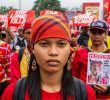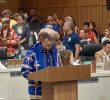DAVAO CITY, Philippines – Journalists and rights advocates reject the proposal from the new head of the Armed Forces of the Philippines to regulate social media under the Anti-Terrorism Act.
Incoming AFP Chief of Staff Lieutenant General Gilbert Gapay made this proposal during his press briefing Monday, claiming that social media is being used by youth groups to “radicalize, to recruit and even plan terrorist acts.”
“We will capitalize on this very good Anti-Terror Law,” said Gapay. “It is comprehensive, it is pro-active and it is geared to prevent the occurrence of terroristic acts. So, we should be able to stop it even if it’s just at planning stage.”
But Karapatan Secretary-General Cristina Palabay said in a statement that the government, military and police do not have “moral authority” to “regulate” the use of social media under the guise of counterterrorism, as she said they have misused their social media posts in tagging activists and journalists as terrorists, which endangers their lives.
READ: Malaybalay police apologizes for info-drive error targeting journalists
“If the military really wants to ‘regulate’ social media use against terrorism, they should start by sanctioning their own men who, through their own social media accounts, have publicly and rabidly accused journalists of being linked to ‘terrorists’ for reporting on human rights groups and civil society organizations, or the accounts of police stations inciting violence against activists through red-tagging, or the ‘shoot-to-kill’ threats posted on the social media accounts of officials like Quezon City Task Force Disiplina’s Rannie Ludovica,” Palabay said.
Ludivoca, who is also councilor in Quezon City, drew flak after issuing a “shoot-to-kill” policy for violators of the quarantine measures following the imposition of the two-week modified enhanced community quarantine (MECQ) in Metro Manila.
Palabay said that any proposal to regulate the use of social media is “tantamount to Marcosian censorship” and sending a chilling effect.
The National Union of Journalists of the Philippines (NUJP) also hit Gapay’s proposal, saying this justifies the petitions to the Supreme Court to declare the law unconstitutional.
“What the good general seeks is no less than the death of freedom of expression,” the group said.
“The only way to defeat an idea is with better ideas. To try forcing one out of existence amounts to terrorism and, more often than not, can only beget more terrorism,” NUJP said.
“Besides, aren’t we supposed to be a democracy, and is not one of the cornerstones of democracy the marketplace of ideas?” they pointed out.
More than 20 petitions had already been filed at the Supreme Court seeking to declare the Anti-Terrorism Act unconstitutional for its contentious provisions including the creation of Anti-Terrorism Council which is given the judicial power to designate terrorists and terrorist organizations based on suspicion and to authorize arrests and detention. (davaotoday.com)









